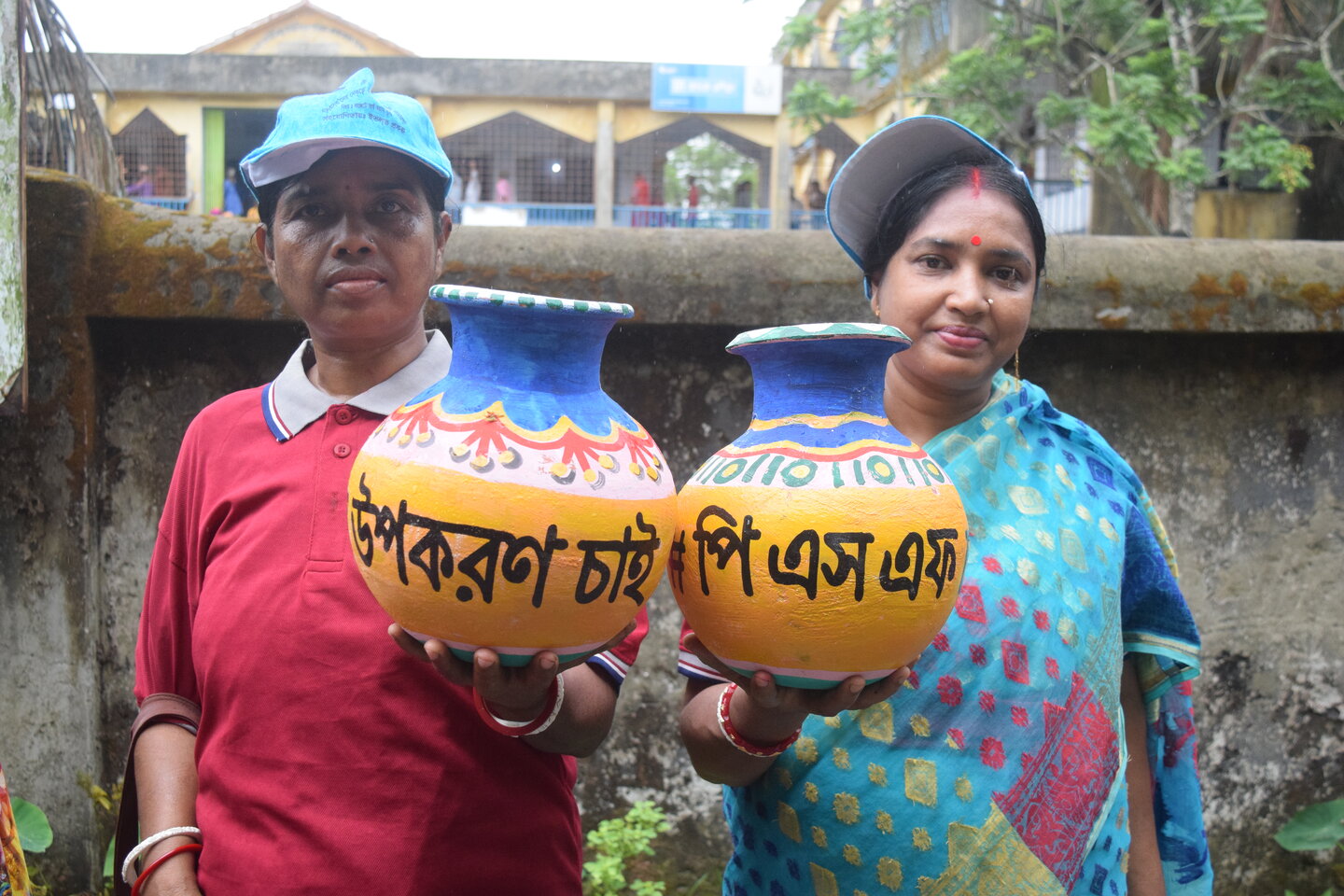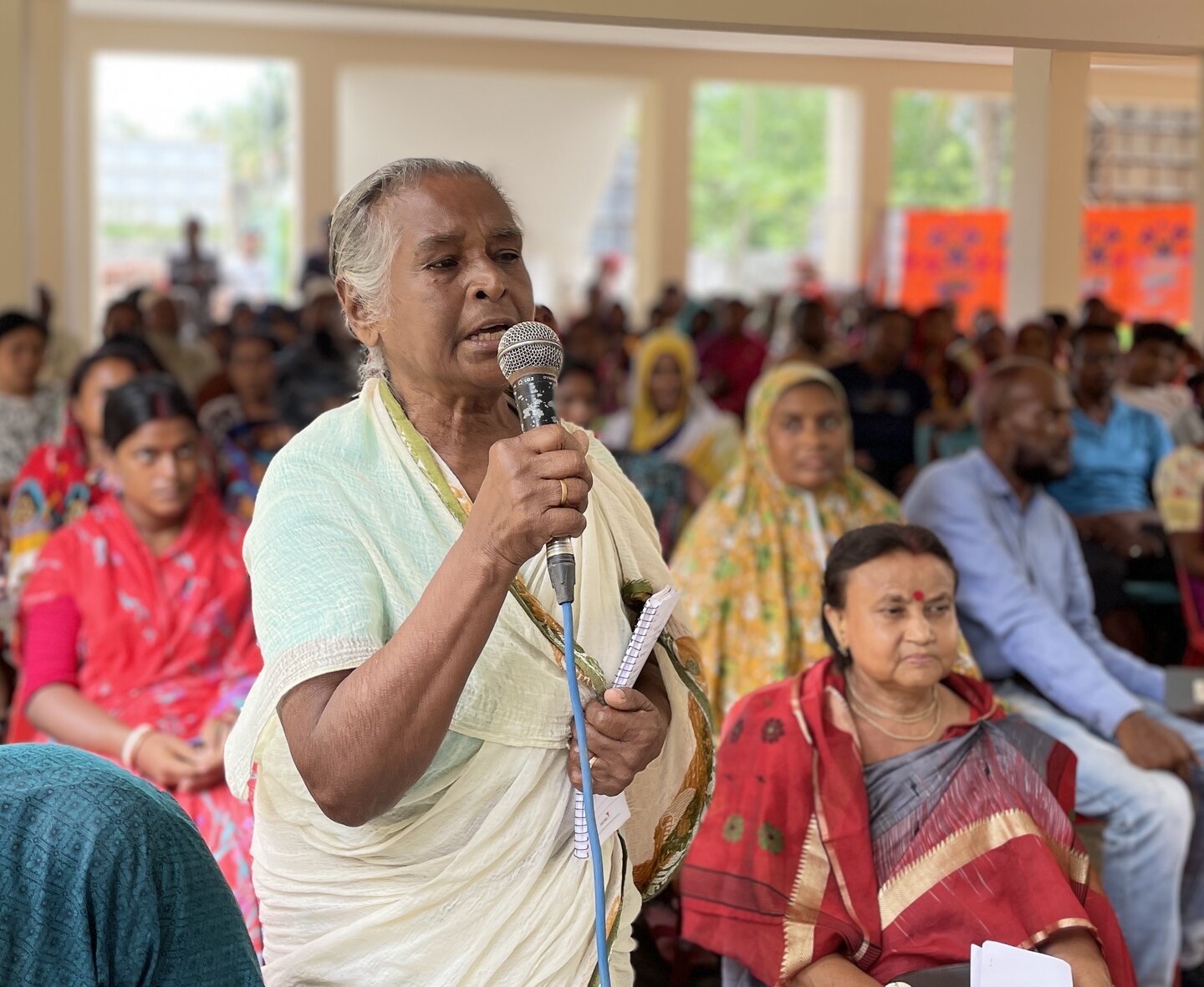Dan Kumari Debi (63) , CSO Member, Bajua Union, Khulna.
In the climate-vulnerable southwest of Bangladesh, participation in local governance has long followed a familiar pattern of male dominated meetings, top-down decisions, and women watching from the margins. Until recently, open budget sessions in Union Parishads rarely saw more than a few women in the audience, let alone at the table. For years, women’s needs remained unspoken — not because they didn’t exist, but because no one was listening.
This began to change as women, determined to be heard, started breaking barriers with EVOLVE project helping to amplify their voices and support their path. Since 2022, Helvetas Bangladesh, with support from the European Union, has been implementing the EVOLVE project (Enhance Voice for the Inclusion of the Vulnerable and their Empowerment) across 28 Union Parishads in Khulna and Bagerhat districts. The project focuses on strengthening inclusive governance, empowering the Civil Society Organizations (CSOs), the Community Based Organizations (CBOs), and helping local government bodies become more gender responsive and climate aware.
In areas where tidal floods, salinity, and cyclones repeatedly displace and destabilize, governance cannot afford to be exclusive. EVOLVE project works to shift this landscape by opening doors, often literally — to people who were once left outside decision-making rooms.
From Silence to Presence
“A few years ago, only a handful of women were invited to open budget meetings — and even then, we weren’t allowed to participate meaningfully. Our presence felt ornamental. But look at us today! There are more women than men here, and we’re speaking up, actively voicing our needs and demands” affirms Lilabati Mondal, Union CSO Member
Just a few years ago, the gender ratio in open budget meetings hovered around 10% women to 90% men. Few women knew when meetings were held, fewer were invited, and almost none used to have the opportunity to speak. Among ethnic minorities and marginalized groups, the silence was deeper still.
Today, those numbers have flipped. Women now make up 70% of participants in open budget meetings across project areas. They’re not just present — they’re prepared, vocal, and engaged. The EVOLVE project supported this change by organizing countless ward level trainings, information literacy sessions, role-playing exercises, and practice in public speaking. Project field facilitators helped build trust and strengthen women’s confidence visiting homes, answering questions and standing by them at the first meetings with the local authorities.
A New Dynamic in Union Parishads
The presence of women has led to more than just symbolic change. Thanks to their consistent advocacy, Union Parishads have adopted gender-responsive budgeting, something that was almost non-existent before. A tangible outcome of this shift is the establishment of breastfeeding corners in 22 out of 28 Union parishad offices — a small but vital change that allows mothers to participate in public life with dignity and ease.
Women are also increasingly taking up leadership roles. 49 women across 28 unions are now active members of standing committees focused on water and sanitation, health, environment, women and child, and social welfare. Their participation has improved both the content and the process of local governance.

Building Collective Power
One of these women is Dan Kumari Debi, 63, a CSO and standing committee member for Women and Child Welfare from Bajua Union. Before EVOLVE project started, she rarely attended a meeting, never raised her voice in public. Through the project’s capacity building and mentoring efforts, she not only became a regular participant at the Union Parishad decision making activity but also an organizer — mobilizing others, submitting petitions, and holding local government accountable.
Dan Kumari Debi
Dan Kumari and other women have successfully lobbied Upazila-level offices to access agricultural training, saline-resistant seeds, and social services — outcomes that directly address the region’s climate vulnerabilities and livelihood challenges.
Shifting Norms, Strengthening Democracy
What makes this shift truly powerful is that institutions are starting to recognize and respond to women’s leadership. Union Parishads now routinely invite women to participate. Budgets are more reflective of diverse community needs. Committees are no longer all males. And public spaces which was once intimidating now echo with women's voices, ideas, and demands.

The EVOLVE project has shown that inclusive governance is not only possible but also effective. When those most affected by climate change and poverty are part of the conversation, solutions become more relevant, sustainable, and just.
This is not only the story of women. It is the story of communities learning to share power, and in doing so, to EVOLVE.




